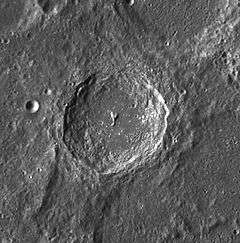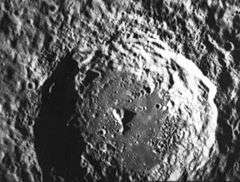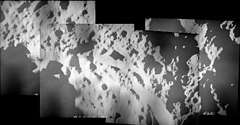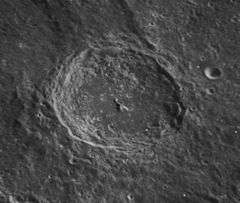Scaliger (crater)
Scaliger is a prominent lunar impact crater in the southern hemisphere on the far side of the Moon. It is attached to the northwest rim of the walled plain Milne, and the shared perimeter has reshaped the outer wall of Scaliger slightly, producing a straightened section along the southeast. To the west of Scaliger is the Lacus Solitudinis.
 LRO WAC image. Scaliger U is the circular crater at left. | |
| Coordinates | 27.1°S 108.9°E |
|---|---|
| Diameter | 84 km |
| Depth | Unknown |
| Colongitude | 252° at sunrise |
| Eponym | Joseph J. Scaliger |



The outer wall of Scaliger is somewhat polygonal in shape, especially in the southern half. The rim has not been heavily eroded by subsequent impacts, in contrast to the heavily worn Milne to the southeast. The inner wall of Scaliger's rim displays terraces, and a notable outer rampart overlaying the floor of Milne. The interior floor of Scaliger is relatively flat, with a rough surface near the inner wall. Near the midpoint is a central peak, offset slightly to the east.
Satellite craters
By convention these features are identified on lunar maps by placing the letter on the side of the crater midpoint that is closest to Scaliger.
| Scaliger | Latitude | Longitude | Diameter |
|---|---|---|---|
| U | 26.6° S | 106.5° E | 11 km |
References
- Andersson, L. E.; Whitaker, E. A. (1982). NASA Catalogue of Lunar Nomenclature. NASA RP-1097.CS1 maint: ref=harv (link)
- Blue, Jennifer (July 25, 2007). "Gazetteer of Planetary Nomenclature". USGS. Retrieved 2007-08-05.CS1 maint: ref=harv (link)
- Bussey, B.; Spudis, P. (2004). The Clementine Atlas of the Moon. New York: Cambridge University Press. ISBN 978-0-521-81528-4.CS1 maint: ref=harv (link)
- Cocks, Elijah E.; Cocks, Josiah C. (1995). Who's Who on the Moon: A Biographical Dictionary of Lunar Nomenclature. Tudor Publishers. ISBN 978-0-936389-27-1.CS1 maint: ref=harv (link)
- McDowell, Jonathan (July 15, 2007). "Lunar Nomenclature". Jonathan's Space Report. Retrieved 2007-10-24.CS1 maint: ref=harv (link)
- Menzel, D. H.; Minnaert, M.; Levin, B.; Dollfus, A.; Bell, B. (1971). "Report on Lunar Nomenclature by the Working Group of Commission 17 of the IAU". Space Science Reviews. 12 (2): 136–186. Bibcode:1971SSRv...12..136M. doi:10.1007/BF00171763.CS1 maint: ref=harv (link)
- Moore, Patrick (2001). On the Moon. Sterling Publishing Co. ISBN 978-0-304-35469-6.CS1 maint: ref=harv (link)
- Price, Fred W. (1988). The Moon Observer's Handbook. Cambridge University Press. ISBN 978-0-521-33500-3.CS1 maint: ref=harv (link)
- Rükl, Antonín (1990). Atlas of the Moon. Kalmbach Books. ISBN 978-0-913135-17-4.CS1 maint: ref=harv (link)
- Webb, Rev. T. W. (1962). Celestial Objects for Common Telescopes (6th revised ed.). Dover. ISBN 978-0-486-20917-3.CS1 maint: ref=harv (link)
- Whitaker, Ewen A. (1999). Mapping and Naming the Moon. Cambridge University Press. ISBN 978-0-521-62248-6.CS1 maint: ref=harv (link)
- Wlasuk, Peter T. (2000). Observing the Moon. Springer. ISBN 978-1-85233-193-1.CS1 maint: ref=harv (link)